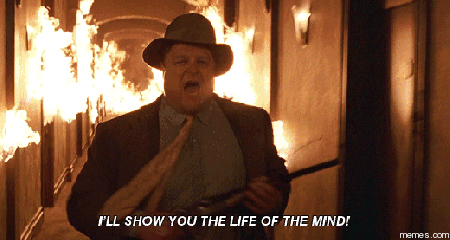One editor's tips for writers submitting to journals, lit mags, and zines
There are "rules" for sending your work to literary magazines, and they don't usually appear in submission guidelines.
Foundlings Vol. 3 will be out in just about two months. We're very excited about this, but we can't share any information about the contents just yet. Submissions closed at the end of March, and we've been reviewing them since then. It's a humbling thing to see an inbox full of so much stirring work from so many writers, friends and strangers both, and a difficult task to pick just a few poems to include in each volume of the magazine. Being an editor, or any kind of curator, forces you to examine your own gut reactions to writing, and to articulate your artistic beliefs and preferences to yourself, to the other editors who share in this work, and eventually to the writers who've submitted. (At least, we try -- more on that further down.)I don't submit my own work to magazines as often as I used to (and some day soon I hope to explain why), but I still devote a lot of postage every year to SASEs. My file of rejections -- digital and physical -- continues to swell steadily, at a greater annual rate of growth than any of my financial investments.
Now, though, a full year and a half since the other Foundlings editors and I decided to start our project, and after three rounds of submissions, I'm starting to think like an editor. I've begun to recognize the most common sins hopeful writers commit during the submissions process. And, lest you misunderstand me, I'm not about to dish on unsavory side of the Foundlings Gmail inbox. We do see some faux pas; some writers make us uncomfortable, and some are unpardonably swinish and rude. But the vast majority are awesome.This isn't about our submissions. Instead, I think, the act of editing now three volumes of poetry, and all the ways that's drawn me into sharing more and more pints and conversations with other writers and editors, have made me more aware of the peccadilloes and travesties writers so frequently commit in their pursuit of publication. For most of the rules below, I could provide a counterexample from my own catalog of bad habits and regrets.So, read on for a few tips all hopeful writers would do well to remember when submitting their work to lit mags and zines.
1. Be the Wayne Gretzky of letters. Or at least the Happy Gilmore.
While many have debated both the attribution and the mathematical accuracy of The Great One's famous assertion that "You miss 100 percent of the shots you don't take," even the most cynical cannot deflect this slapshot of an aphorism. I've heard many writers explain why they haven't submitted to such-and-such a magazine, and their reasons are usually pretty similar: "I don't know if they'll like me," or "I'm not sure if I'm ready yet," or "They only publish people with MFAs/cool names." All of these things might be true. Editors might not like you. You might not be ready yet. And entire magazine staffs might have really idiotic and lame conscious or unconscious biases. But you should probably submit anyway. Take that shot.
All of these things might be true. Editors might not like you. You might not be ready yet. And entire magazine staffs might have really idiotic and lame conscious or unconscious biases. But you should probably submit anyway. Take that shot. In most cases, the excuses I've listed above are code for "I'm not a serious writer." So, maybe you aren't. That doesn't mean you'll never be a serious writer. The change could come when you decide that you have to be great, that you are great, and that other people will love you for it. Not all the people who feel that way are, great, of course. But the people who feel that way are more likely to keep writing and keep submitting until they do write good work; more likely to submit that good work; and more likely to see their good work in print.There are only two reasons that should ever stop you from licking that stamp. One, don't submit if you know in the blue flame of your writerly heart that you'd be mortified to see some flawed or unfinished work in print. For the second reason, keep reading.
In most cases, the excuses I've listed above are code for "I'm not a serious writer." So, maybe you aren't. That doesn't mean you'll never be a serious writer. The change could come when you decide that you have to be great, that you are great, and that other people will love you for it. Not all the people who feel that way are, great, of course. But the people who feel that way are more likely to keep writing and keep submitting until they do write good work; more likely to submit that good work; and more likely to see their good work in print.There are only two reasons that should ever stop you from licking that stamp. One, don't submit if you know in the blue flame of your writerly heart that you'd be mortified to see some flawed or unfinished work in print. For the second reason, keep reading.
2. Read the magazine before you submit.
I know, every single blogger ever to tackle this topic (and there have been many), remind writers to read any magazine to which they're submitting. I've received this advice, and I've ignored this advice. In fact, you might be tempted to use Tip No. 1 to parry and riposte this Tip No. 2. However, if you're submitting to magazines you haven't read, your head's in the wrong place. You're doing this for random validation; a publication from a magazine you don't know is only slightly more valuable than an Instagram like from a stranger. Respect yourself and respect the editors who read your work.If you're a writer and your agent isn't placing your stories in The New Yorker for you, then you can't afford to subscribe to every lit mag in the world. No matter. There are plenty of ways to get free copies of literary publications (many college libraries have dedicated lit mag sections), and some publications offer free content online. (Foundlings, for example, has free poems on the site, a free mini-zine, and a free digital download of Vol. 1 available.) Some publications, like our friends at Peach, are totally free.Can't be bothered? Then you and your "work" probably don't belong here.
3. Editors often aren't certain why they chose not to select your piece, so don't expect an exegesis stapled to your pink slip.
This great nugget came from one of my writing mentors, Mick Cochrane. I had forwarded a nice-enough rejection from an agent who'd read the first chapter of my novel, mentioning something about the "huge word count." My question: was this guy right, or should I stick with my gut? Mick's answer: Let's get a coffee.If you had the chance to sit down for a coffee with any editor or agent to which you'd submitted work, it would be a conversation full of valuable insights -- about your work, about the inner workings of the magazine or agency, about the literary "marketplace," etc. The two prerequisites for this kind of insight, though, are time, and dialogue. It's a rare writer that develops this kind of relationship with a magazine editor. Most submissions to literary magazines end with an editor typing a writer's name into an email, and then pasting a block of text that starts with "Thank you" and passes "unfortunately" and doesn't say much matter after that.
Mick's answer: Let's get a coffee.If you had the chance to sit down for a coffee with any editor or agent to which you'd submitted work, it would be a conversation full of valuable insights -- about your work, about the inner workings of the magazine or agency, about the literary "marketplace," etc. The two prerequisites for this kind of insight, though, are time, and dialogue. It's a rare writer that develops this kind of relationship with a magazine editor. Most submissions to literary magazines end with an editor typing a writer's name into an email, and then pasting a block of text that starts with "Thank you" and passes "unfortunately" and doesn't say much matter after that. This is the form rejection. It's a necessity. The editor's time is better spent serving the magazine than struggling to justify a decision about style to satisfy every single writer that submits (all of whom would probably still be dissatisfied with even the most eloquent and generous rejection).That's important to remember: the acceptance or rejection of a piece always starts, and often ends, with a gut reaction. Could the editor explain why she rejected your piece? I hope so. But, like I said, it would take time, atmosphere, starts and stops, revisions, body language, a beverage.Now, if your piece made it past a certain stage in the review process, but not all the way to publication, some editors will write a personalized note (like the one in the picture above ... I mean the Instagram picture ... or, OK, maybe like Leo's dickbutt, too) to soften your rejection. Sometimes these are more cryptic than insightful (again, see both pictures above). Still, if you've received a personalized rejection you should cherish this the way you would any thoughtful compliment from someone you respect. I keep mine in a folder separate from the form rejections (which I also keep -- more on that later).
This is the form rejection. It's a necessity. The editor's time is better spent serving the magazine than struggling to justify a decision about style to satisfy every single writer that submits (all of whom would probably still be dissatisfied with even the most eloquent and generous rejection).That's important to remember: the acceptance or rejection of a piece always starts, and often ends, with a gut reaction. Could the editor explain why she rejected your piece? I hope so. But, like I said, it would take time, atmosphere, starts and stops, revisions, body language, a beverage.Now, if your piece made it past a certain stage in the review process, but not all the way to publication, some editors will write a personalized note (like the one in the picture above ... I mean the Instagram picture ... or, OK, maybe like Leo's dickbutt, too) to soften your rejection. Sometimes these are more cryptic than insightful (again, see both pictures above). Still, if you've received a personalized rejection you should cherish this the way you would any thoughtful compliment from someone you respect. I keep mine in a folder separate from the form rejections (which I also keep -- more on that later).
4. Don't cross the streams.
I did not just give you license to ask an editor out for coffee, only to ambush her with a copy of the magazine in which your work didn't appear. If you happen to be friends or acquaintances with an editor, you must not mix your personal and professional relationships.Why do you need to keep these relationships separate? Try to imagine all life as you know it stopping instantaneously and every molecule in your body exploding at the speed of light.https://www.youtube.com/watch?v=jyaLZHiJJnEIt can hurt to receive a rejection from someone you know. It's much more uncomfortable for the editor. If you lash out, confront, moan, Tweet, post on Facebook, whisper to other friends, or in any other way talk about that editor's decision to reject your piece, know that you're speaking as a writer, but from the privileged position of a friend. For the editor, that friendship is no longer a position of privilege, but a burden. The editor feels like you're calling her an asshole; you're actually being an asshole; the whole world is an asshole. Your negative emotions suggest that you thought your relationship with an editor entitled you to a reward: publication. If someone you know has rejected you from a magazine and you're really concerned about improving your work, think carefully. If you can approach the topic with an honest and unclouded mind, without risk of abusing your friendship, then, after some time has passed, go ahead and approach the editor-friend. Get that coffee, or that beer, and talk -- not about the rejection, but about how you can improve. Or, if you think they have bad taste, don't submit to that mag ever again -- but keep the friendship.
If someone you know has rejected you from a magazine and you're really concerned about improving your work, think carefully. If you can approach the topic with an honest and unclouded mind, without risk of abusing your friendship, then, after some time has passed, go ahead and approach the editor-friend. Get that coffee, or that beer, and talk -- not about the rejection, but about how you can improve. Or, if you think they have bad taste, don't submit to that mag ever again -- but keep the friendship.
5. Track and archive everything.
 You must track your submissions. It doesn't matter how you do this; but you need some kind of organizing system so that you:
You must track your submissions. It doesn't matter how you do this; but you need some kind of organizing system so that you:
- Don't send a magazine a piece you sent in an earlier submission cycle.
- Don't send a magazine any work you had published elsewhere, even if it was on some obscure neu alt-alt-alt-lit Tumblr zine.
I've seen both happen, and no matter the quality of the work, it makes the writer look like an attention-hounding, inconsiderate hack and an all-around undesirable. If you had work published a print magazine with a circulation of 50, based in a remote Swiss mountaintop village, and that village was swallowed in an avalanche, ask the editor if they'd be interested in looking at the work, given the circumstances, before you submit it.Do ignore a magazine's refusal of simultaneous submissions, unless the magazine has a really good reason for this asinine policy. Mags that take six months to send a form letter saying, No, we will not compensate you for your story with one contributor copy, cannot justify exclusive rights to your work for that period. With the authority vested in me, as managing editor of a relatively unknown zine couched in Erie's eastern crotch, I forbid all other zine editors to deny simultaneous submissions. (I can imagine one exception: if an editor has solicited work from you, don't send that piece to anyone else.)Follow up your tracking with archiving. Keep every acceptance or rejection, print or digital. It will save trees when it comes time for your Viking burial.
6. Don't publish just to publish.
There are two kinds of people-who-write: writers, and diarists.Diarists write for personal pleasure. They might be flattered by a publication, but they do not actively seek publication. Even if they "want" to be published, this desire isn't strong enough to overcome their fear of rejection, lack of self-esteem, various resentments against "the industry," and indifference. They will be satisfied with a pen and a journal, and the feeling of calm and control and release that this gives anyone who learns to use them. Writers write for love. Whatever it is they love -- the world, the Word, themselves, or other people -- this love is so powerful that they want to use it to convert the rest of humanity to the same kind of love. Writers suffer from the same feelings that stop the diarists from publishing, and sometimes they feel them even more powerfully. But the love, and the need for love in response, is stronger still.
Writers write for love. Whatever it is they love -- the world, the Word, themselves, or other people -- this love is so powerful that they want to use it to convert the rest of humanity to the same kind of love. Writers suffer from the same feelings that stop the diarists from publishing, and sometimes they feel them even more powerfully. But the love, and the need for love in response, is stronger still. There are downsides to both inclinations. The diarist may never hone or share a great talent -- her loss as well as the world's. The writer's love may blind her from ... well, all of reality, sort of like Morrissey up there.If you're looking for places to submit your work, take a bit of the diarist's circumspection to temper your writerly joi and presumption (though you should never get rid of those qualities entirely). Not all publications are equal. Not all publications are a good fit for you, and you are not a good fit for all publications. When deciding where to submit, think about:
There are downsides to both inclinations. The diarist may never hone or share a great talent -- her loss as well as the world's. The writer's love may blind her from ... well, all of reality, sort of like Morrissey up there.If you're looking for places to submit your work, take a bit of the diarist's circumspection to temper your writerly joi and presumption (though you should never get rid of those qualities entirely). Not all publications are equal. Not all publications are a good fit for you, and you are not a good fit for all publications. When deciding where to submit, think about:
- The quality of the work in the magazine.
- The magazine's reach.
- Your current writerly career goals.
- The quality of the piece you're shopping about.
Will you be proud to appear in this magazine? Will you be proud after the Facebook likes from friends who haven't read and probably won't read the published piece you're celebrating with a victory pic slow, and then stop completely?Who actually reads this magazine? Are you doing this to add another obscure name to your already 600-word writer's bio? Or are you doing it to be loved for your work?Are you at a point in your career where you need to be strategic about your publications? Are you prepping for a tour that will pass through this magazine's city? Are you looking for a cushy university post that will recognize and reward publication credits from MFA-run journals? Are you trying to snag an agent with a published sample chapter? Sorry if these questions seem a bit unsavory, but you've got to know how to skin a deer to ... oh, forget it.What I mean is that we all die eventually but our works live a little bit longer, etc. etc., so if you want to be a writer, be careful, bide your time, pay your debts, and do your own stunts. Any writer who must say "I am a writer" with a truckload of dubious and uneven publications is no true king -- er, I mean writer. In fact, one of my favorite Buffalo poets, Eve Williams Wilson, barely published anything in print. She's found other, better ways to connect with her audience (which, by the way, is pretty big, and composed of people who care).
Sorry if these questions seem a bit unsavory, but you've got to know how to skin a deer to ... oh, forget it.What I mean is that we all die eventually but our works live a little bit longer, etc. etc., so if you want to be a writer, be careful, bide your time, pay your debts, and do your own stunts. Any writer who must say "I am a writer" with a truckload of dubious and uneven publications is no true king -- er, I mean writer. In fact, one of my favorite Buffalo poets, Eve Williams Wilson, barely published anything in print. She's found other, better ways to connect with her audience (which, by the way, is pretty big, and composed of people who care).
So ... are you ready?
 Then go ahead. Press send. Place the stamp and drop the letter. Then get back to writing.
Then go ahead. Press send. Place the stamp and drop the letter. Then get back to writing.